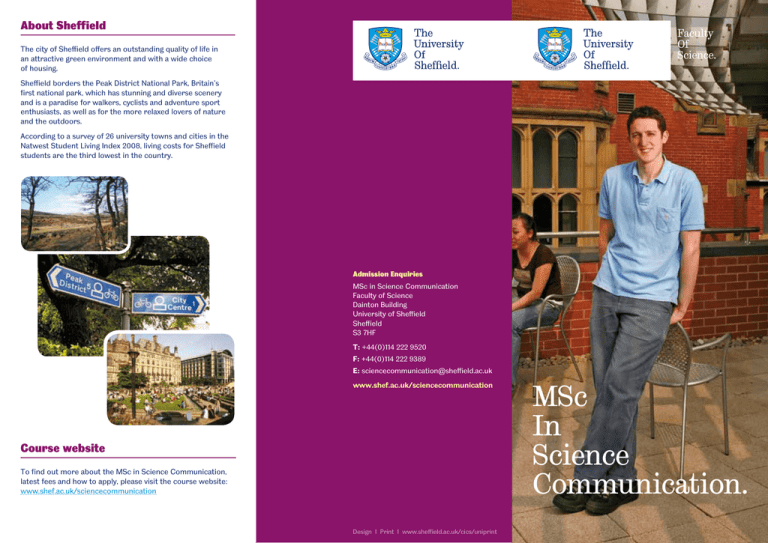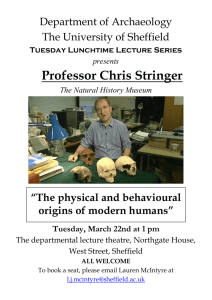MSc In Science Communication.
advertisement

About Sheffield Faculty Of Science. The city of Sheffield offers an outstanding quality of life in an attractive green environment and with a wide choice of housing. Sheffield borders the Peak District National Park, Britain’s first national park, which has stunning and diverse scenery and is a paradise for walkers, cyclists and adventure sport enthusiasts, as well as for the more relaxed lovers of nature and the outdoors. According to a survey of 26 university towns and cities in the Natwest Student Living Index 2008, living costs for Sheffield students are the third lowest in the country. Admission Enquiries MSc in Science Communication Faculty of Science Dainton Building University of Sheffield Sheffield S3 7HF T: +44(0)114 222 9520 F: +44(0)114 222 9389 E: sciencecommunication@sheffield.ac.uk www.shef.ac.uk/sciencecommunication Course website To find out more about the MSc in Science Communication, latest fees and how to apply, please visit the course website: www.shef.ac.uk/sciencecommunication Design I Print I www.sheffield.ac.uk/cics/uniprint MSc In Science Communication. Aims of this course Why choose this Masters course? Communicating science clearly and effectively is vitally important, for researchers, the community, business, industry, public bodies and policy makers. To meet this challenge this course will: This course will equip you with a wide range of skills that would allow you to communicate science in a variety of different roles, providing opportunities across a wide range of employers in science and technology, the medical and pharmaceutical industries, the cultural industries, the science policy sector, education or the media. • Teach you how to communicate science to a wide variety of audiences through a mix of different media, including print, web, on-line and audio/video. • Enable you to develop your skills in designing and running face-to-face events and to engage with diverse groups, from specialist to generalist, of all ages. • Allow you to develop the necessary skills to become an effective communicator of science. Course outline You’ll cover a wide range of topics, from understanding why and how to communicate science, to organising and hosting a science exhibition. In addition, our innovative Masterclasses, with experts in their own scientific discipline, will help you to understand aspects of science that you may not have covered previously and also provide you with a broad overview of many areas of contemporary science. A major part of your studies will be the development of a written portfolio of work in our newsroom. Here you will learn to communicate through clear, compelling and concise story telling. You will also have the chance to produce a dissertation where you will address important issues relevant to the communication of science through hands-on experience, practical demonstrations or critically reviewing the literature. Career opportunities Alternatively you could communicate your own research if you go on to (or already have) a science research career. Or you could join one of the many science organisations or professional bodies as a press-officer or policy maker. This exciting new course offers contributions from worldleading scientists and media practitioners in the field of Science Communication and Journalism. Collectively, we have personal experiences of the delivery of science through many platforms including newspapers, periodicals, radio and television/film, web sites and social networks as well as writing articles and books. The form of delivery chosen is that which is most effective for the recipient audience, whatever their background and age. As well as input from experienced scientists, there is a vital contribution from the Department of Journalism Studies. This department has been top in the UK for student satisfaction in Journalism over recent years. This combination of science technology and medical departments working with a Department of Journalism Studies is unique in the UK. Our internationally recognised expertise, coupled with access to state-of-the-art media facilities and teaching staff with extensive professional experience in Fleet Street and at the BBC, will provide you with unparalleled support for your studies. Why study at the University of Sheffield? The University of Sheffield is one of the UK’s leading universities, with an international reputation for excellence in both teaching and research being one of the top 100 Universities in the World. It has recently been placed second in the UK for its student experience (THES, 2011). In teaching, 29 of our subject areas have been graded as Excellent, the UK’s third highest. For research, independent assessment places us among the top ten in the UK. As well as providing you with the latest and best facilities to aid your studies, at Sheffield we provide a host of support resources to take care of your well-being. The opportunities are endless! Who is eligible for the course? The course is aimed at students who have (or expect to obtain) at least an upper second BSc in a subject related to Biology, Chemistry, Engineering, Mathematics, Physics or Psychology. You should have a passion for science and a desire to communicate scientific ideas to a general audience. Specific technical skills are not required (we will teach you that) but you should have a good command of the English language. Where English is a second language, applicants must be able to provide evidence of proficiency to IELTS 7.0 with minimum of 6.5 in each element (or equivalent qualification).



